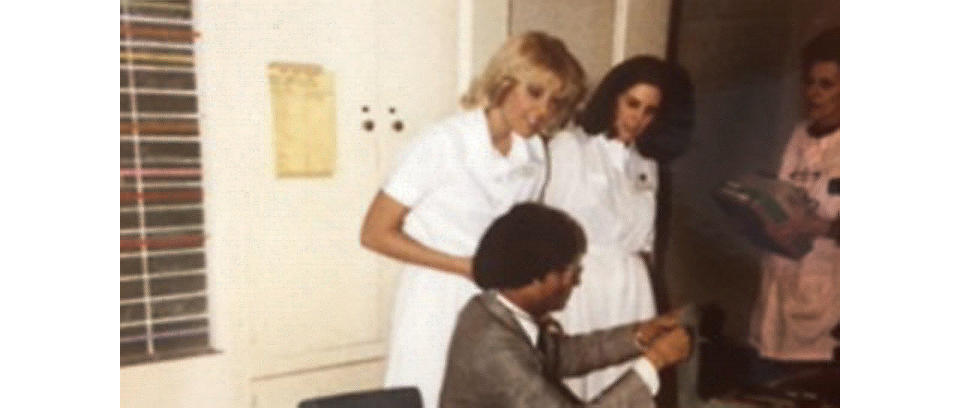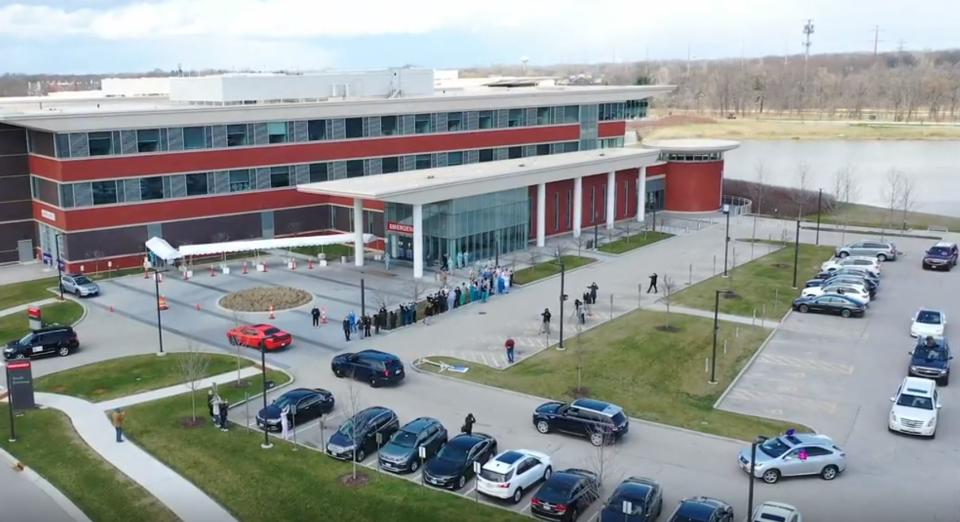Nursing Exec Leads Lake Forest Hospital To Magnet 'Gold Standard'
LAKE FOREST, IL — For Denise Majeski, Lake Forest Hospital's chief nursing officer, April 14 was an emotional day. It was her 40th anniversary working at the hospital. A few weeks into the stay-at-home order issued in response to the coronavirus pandemic, it was also the day when Lake County public safety workers arranged a parade of dozens of cars to show support for hospital workers.
"I was very touched," Mejeski told Patch. "All the first responders came in their cars and fire trucks, and all their vehicles paraded in front of the hospital in support of our front-line caregivers. So I remember going out that day and feeling great pride."
In her four-decade career at the hospital, Majeski became the hospital's first endowed chief nurse executive, created its first patient advisory council and led its nurses through a series of challenges — both medical and practical.
"You get to see it, experience it, and then re-experience — and then this time lead it," she said.
Majeski, 65, of Gurnee, started her nursing career in the oncology department and later became a charge nurse at St. Francis Hospital in Evanston, which shared a medical director with then-independent Lake Forest Hospital at the time.
When she first applied to work in Lake Forest, Majeski remembers being told, at age 25, that she was too young. But after the head nurse left unexpectedly, Majeski found herself in the position after just a few months on staff at the 118-bed hospital.
"They couldn't find anybody so they said 'tag you're it,' and Lake Forest Hospital has afforded me great opportunities for moving around," Majeski said. She later worked in critical care areas, as nursing supervisor and director of case management, among other roles.

"In 40 years, it's kind of like what goes around comes around. It just keeps coming back. When I worked in oncology we had surge volumes of cancer patients from the community," Majeski said, attributing the mostly younger group of patients to the effects of the Zion nuclear power plant.
"We were constantly at surge, we had to use our sunroom for capacity management. We placed beds in there. We had our hallways lined with chairs for outpatient infusion services," she said. "So I've seen that."
Lake Forest Hospital opened a new hospital building in 2018 after joining Northwestern Medicine in 2010.
"Now when I look back and we've built our new facility — we were thinking: 'Oh, this is great we've got 114 beds," she said. "We have been at 103 to 110 percent capacity ever since we moved in here. So this is the same scenario, except on a larger scale. You have to learn how to manage through and make sure you have strong nursing leaders. You have to be able to adapt to the call from the community."

A year before the new facility opened, Majeski faced another challenge: the hospital's first-ever evacuation during the July 2017 flooding in Lake County. While the hospital was unreachable by ambulances from the north and west for a time, Majeski said ambulances from Northwestern Memorial Hospital in Chicago were able to reach the hospital and help transport patients out. Majeski said previous experiences with electrical shutdowns and mechanical problems in the building that prompted internal evacuations from one part of the hospital to the other also helped prepare her for the moment.
"To me that was just one more day," Majeski said. "OK, we now have to evacuate the hospital."
Majeski said the nursing team was ready again when the emergence of COVID-19 forced major changes to hospital operations. With operations put on hold, a pre- and post-operative care center was used to expand the capacity of the hospital's intensive care unit, which expanded from 12 beds to care for up to 36 patients at a time.
"We have what's called a team model of nursing here, but we had to actually get a little more creative during COVID. So that's just another crisis. We had to deal with it with AIDS, we had to deal with it with anthrax, after anthrax it was Ebola, and then after Ebola now it's COVID. So we we've seen these kinds of pandemics that come up that require our physicians to be even more clinically skilled as well as our nurses to be able to manage the unknown," she said.
"We didn't know about HIV. We didn't know how bad Ebola would get. We didn't know how bad anthrax was going to get — who was going to get envelopes of the powder — and then how to manage that, and the same thing with COVID."
Nursing staff members were reassigned, resulting in better patient-to-staff ratios than before the pandemic, Majeski said. Some received refresher training to be more confident at the bedside; others served as liaisons to families as they dealt with new visitor restrictions imposed during the pandemic.
In an effort to minimize time spent in rooms with COVID-19 patients, IV pumps were moved to the hallway. Majeski said only two nurses on the staff contracted the virus from potential exposure at work. Both have recovered.
And while 42 percent of the over 21,000 nurses who responded to a recent American Nurses Association survey reported that they were experiencing intermittent or widespread shortages of personal protective equipment, with nearly 60 percent having to re-use N95 masks for five or more days, Majeski said nurses at Lake Forest Hospital reported high levels of satisfaction with supplies during the pandemic during the hospital's recent "Magnet" re-designation by the American Nurses Credentialing Center.
It was Lake Forest Hospital's third Magnet designation, which is considered the "gold standard" of nursing since it was established in 2010 and must be re-certified every five years. Majeski oversaw the hospital's two re-designations after becoming chief nursing executive in 2013. Only 523 hospitals — 9 percent nationwide — have achieved Magnet status.

Thomas McAfee, president of Northwestern Medicine Lake Forest Hospital, praised Majeski's dedication to her work and service to the institution in a statement.
“There is no one more committed to the nursing profession than Denise Majeski,” McAfee said. “Her passion for providing the highest level of compassionate patient care has never wavered in the more than 40 years she has served our hospital, and she continues to lead our nursing team to deliver the highest level of patient care possible. Her leadership has driven significant positive changes in our overall patient care team approach, which benefits our patients every day.”
After four decades at Lake Forest Hospital, is Majeski ready to retire?
"I mentioned it," she said. "But the president said, 'Let's talk about that later,' so I guess I've got another year."
This article originally appeared on the Lake Forest-Lake Bluff Patch

